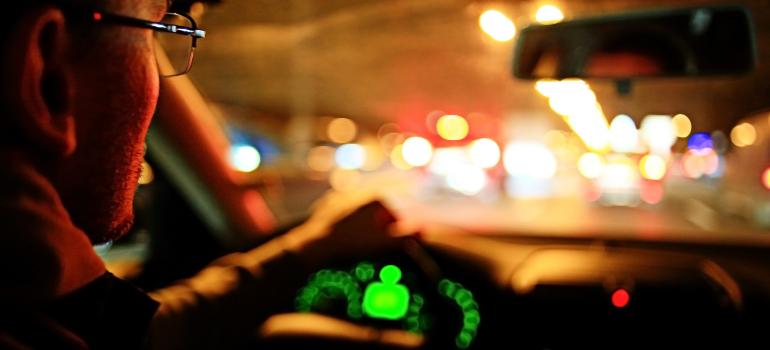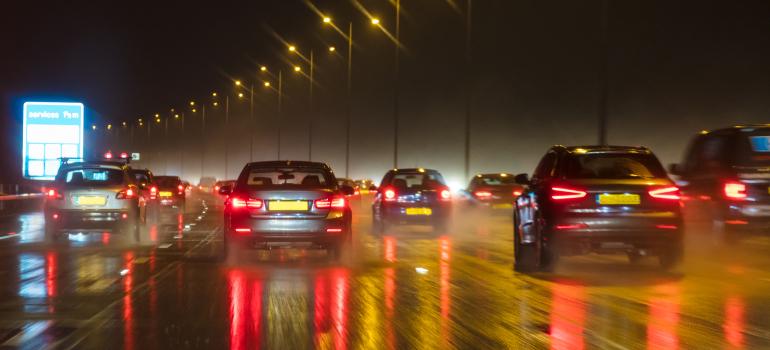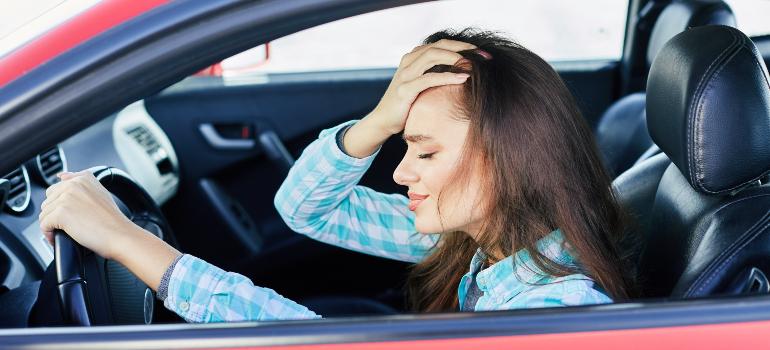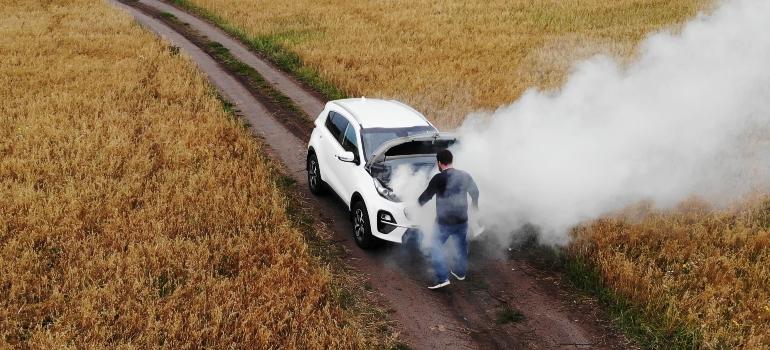What scares parents of new drivers
What do parents of new drivers find the most scary, and what can they do to help combat these fears?

By Marmalade Author
Updated on Jun 17th, 2022
For many parents, nerves about their child driving a car don’t simply disappear once they have passed their test, and for some, they can get worse thinking about their child driving unsupervised! We asked 197 parents of new drives what they were most worried about and have written some tips on how you can overcome these nerves!
1
Driving in poor weather

Of the 197 parents we asked, 55% stated that they were concerned about their child driving in poor weather conditions, making it the most popular response.
The best thing to do is to supervise your child driving in bad condition. You don’t have to wait until they have passed to do this, and if you are able to get the extra private practice in while they are still learning. Our learner driver insurance can help you do this before they have passed, and you can get a quote in only a few minutes! The tricky thing about practising driving in bad weather is having to wait for it to rain, but in the UK, you never have to wait too long!
What parents need to remember is that slippery road were the cause of only 7% of road accidents in the UK**, so as long as your child is driving carefully, they are most likely to be okay driving in poor weather.
We have written a blog on how to drive in heavy rain and wind to help new drivers with these tricky conditions.
The best thing to do is to supervise your child driving in bad condition. You don’t have to wait until they have passed to do this, and if you are able to get the extra private practice in while they are still learning. Our learner driver insurance can help you do this before they have passed, and you can get a quote in only a few minutes! The tricky thing about practising driving in bad weather is having to wait for it to rain, but in the UK, you never have to wait too long!
What parents need to remember is that slippery road were the cause of only 7% of road accidents in the UK**, so as long as your child is driving carefully, they are most likely to be okay driving in poor weather.
We have written a blog on how to drive in heavy rain and wind to help new drivers with these tricky conditions.
2
Other drivers

49% of parents said they were worried about encounters with other drivers. You can be the best driver in the world, but the one thing you can’t control are other road users. This is something everyone worries about in their own driving, let alone the driving of a child who has recently passed. The best thing to do is to remind your child to remain conscious of other drivers and to always leave enough space and time for other drivers so that if something unexpected does happen, they can react in time.
The most important thing the child needs to remember is to remain calm and remember what they have been taught. Most situations can easily be avoided, so there is no need to panic.
The most important thing the child needs to remember is to remain calm and remember what they have been taught. Most situations can easily be avoided, so there is no need to panic.
3
Driving on motorways

Driving on a motorway is something that most drivers won’t do until they passed their test so it’s no wonder 40% of the parents we asked are concerned about it. In 2018, the law changed which allowed learner drivers to drive on motorways with a dual control car with an instructor. If this is something that you have available to you, gaining experience driving on a motorway with a trained instructor is only going to help you improve. It will give you the chance to get to grips with using more than just 2 lanes as well as teaching you what to do if you were to break down or were to have an accident on a motorway. We have written a blog on what to expect in a motorway driving lesson if you want a more in-depth look.
To help calm your nerves further, there is no reason why you can’t still accompany your child on a motorway once they have passed their test so that the first time they drive on one they aren’t doing it alone.
To help calm your nerves further, there is no reason why you can’t still accompany your child on a motorway once they have passed their test so that the first time they drive on one they aren’t doing it alone.
4
Lack of experience

Lack of experience is at the root of all the worries parents have on this list, and as such 39% of parents said this is something they worry about. Not enough experience driving at night, in the rain, on a motorway, the list goes on.
Unfortunately, there isn’t much of a cure for this worry, apart from time. The more they drive, the more capable they will become and the safer they will drive. If you still need a bit more to put your mind at rest, try and supervise some more driving once they have passed their test. This will help bad habits creeping in once they’ve passed their test, and give you confidence in their driving.
Another option is to enrol on the pass plus course. This course teaches newly qualified drivers about driving at night, driving on the motorway, driving on rural roads, and other extra skills.
Unfortunately, there isn’t much of a cure for this worry, apart from time. The more they drive, the more capable they will become and the safer they will drive. If you still need a bit more to put your mind at rest, try and supervise some more driving once they have passed their test. This will help bad habits creeping in once they’ve passed their test, and give you confidence in their driving.
Another option is to enrol on the pass plus course. This course teaches newly qualified drivers about driving at night, driving on the motorway, driving on rural roads, and other extra skills.
5
Driving at night

Driving a night isn’t something that many learner drivers will have had to do before passing their test, and because of this, 38% of parents worry about their child having to do it.
The best way for parents to help overcome their fear of their child driving at night is to accompany them on a drive at night. Just because they have passed their test, it doesn’t mean they have to take every journey on their own, and having the experience of someone who has driven at night before will help them understand what they need to look out for, as well as giving you that comfort that you have helped them get the experience they need to do this alone.
The best way for parents to help overcome their fear of their child driving at night is to accompany them on a drive at night. Just because they have passed their test, it doesn’t mean they have to take every journey on their own, and having the experience of someone who has driven at night before will help them understand what they need to look out for, as well as giving you that comfort that you have helped them get the experience they need to do this alone.
6
Distractions

Even experienced drivers get distracted from time to time, so it is only natural that 38% of you worry about your child getting distracted while behind the wheel.
Most new drivers worry about this as well. One of the best things to do is to set some ground rules with your child to try and minimise distractions. This could be to keep their mobile phone holstered so they can’t pick it up or keep the radio turned off or on a low volume. Although you might think new drivers are easily distracted, it important to remember that familiarity breeds contempt and more experienced drivers are just as likely to get distracted. As a parent, your child will look to you for guidance, and if you use your phone in the car, or get distracted while driving, your child is more likely to do the same. As driving is still new to recently passed drivers, it takes up more of their attention, making it less likely for them to become distracted!
Our black box insurance monitors phone usage, encouraging safe, non-distracted driving. You can find out more about how driving is monitored, and get a quote for cover for your child to drive their own car or to drive your car.
Most new drivers worry about this as well. One of the best things to do is to set some ground rules with your child to try and minimise distractions. This could be to keep their mobile phone holstered so they can’t pick it up or keep the radio turned off or on a low volume. Although you might think new drivers are easily distracted, it important to remember that familiarity breeds contempt and more experienced drivers are just as likely to get distracted. As a parent, your child will look to you for guidance, and if you use your phone in the car, or get distracted while driving, your child is more likely to do the same. As driving is still new to recently passed drivers, it takes up more of their attention, making it less likely for them to become distracted!
Our black box insurance monitors phone usage, encouraging safe, non-distracted driving. You can find out more about how driving is monitored, and get a quote for cover for your child to drive their own car or to drive your car.
7
Breakdowns

Having a breakdown is something all drivers are concerned about, so it is only natural that parents worry about their child being stranded at the roadside.
The easiest way to put your mind at rest over a breakdown is to take the right precautions to prevent a breakdown from happening. Regular vehicle checks such as engine oil, washer fluid and tyre wear, among other checks you can do at home are some of the best ways to stop faults before they happen.
Around one-third of the 1725 qualified young drivers we asked, said they were not very or not at all confident on basic car maintenance. If this is you, we have multiple blogs on car maintenance, such as a car maintenance checklist and how to change a tyre.
You can also look to arrange breakdown cover. Although this isn’t a legal necessity like insurance, breakdown cover can give you extra peace of mind. Hopefully, you’ll never need to use it, but if something happens it’s handy to know there’s someone you can call!
The easiest way to put your mind at rest over a breakdown is to take the right precautions to prevent a breakdown from happening. Regular vehicle checks such as engine oil, washer fluid and tyre wear, among other checks you can do at home are some of the best ways to stop faults before they happen.
Around one-third of the 1725 qualified young drivers we asked, said they were not very or not at all confident on basic car maintenance. If this is you, we have multiple blogs on car maintenance, such as a car maintenance checklist and how to change a tyre.
You can also look to arrange breakdown cover. Although this isn’t a legal necessity like insurance, breakdown cover can give you extra peace of mind. Hopefully, you’ll never need to use it, but if something happens it’s handy to know there’s someone you can call!
Save money with Black Box Insurance
No fuss black box insurance helps young drivers stay safe and build confidence on the roads
Join thousands of young drivers enjoying comprehensive cover with no curfews or night-time driving restrictions

Parent advice
Advice and guides for parents helping their learner driver on their driving journey.

Black Box Mythbusters
There’s a lot of misconceptions around driving with a black box – we’ve got the facts on what’s true and false!

Visit the Driver Hub
Check out the latest stories and blogs from young drivers



